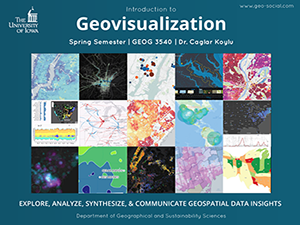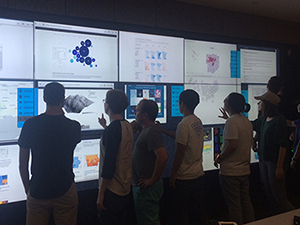Caglar Koylu
My research interests are at the intersection of GIScience, network science, cartography and visualization with an emphasis on addressing real-world problems in diverse areas such as human mobility and migration, kinship networks, population geography, demography, public health, hazards and social vulnerability, public discourse and sentiment, and information diffusion.
Check out FlowMapper, a web-based tool we developed for visualization and analysis of flows - anything that moves across space-time such as humans, animals, flights, money, and information!
Office hours
- Tuesdays: 10:00 - 11:30 a.m.
- Thursdays: 10:00 - 11:30 a.m.
Research interests
- GIScience
- Cartography
- Visualization
- Spatiotemporal analysis and statistics
- Human mobility and migration
- Population-scale kinship networks
Prospective graduate students
I am always looking for MS/PhD or PhD students with one or more of the following research interests:
- Human mobility and migration
- Population-scale family trees & geographically-embedded social networks
- Spatial interaction analysis and visualization (e.g., network measures, spatial community detection, spatial interaction modeling and diffusion models, flow mapping and clustering)
- Geovisual analytics and human computer interaction (e.g., interactive cartography, flow mapping, coordinated views, and utility and usability evaluation, eye-tracking studies)
- Network science, machine learning, GeoAI
In addition to the above research interests, students should have, or be interested in developing, ability in:
- Foundations of GIScience
- Geospatial programming and statistical computing in Python, Java, R
- GIS Software such as ArcGIS or QGIS
- Database management systems such as PostgreSQL/PostGIS, GeoParquet, MongoDB, etc.
- High performance computing, Spark, Hadoop, etc.
- Web-based GIS and Geovisualization: JavaScript, D3, React, etc.
- Interactive computing using Jupyter and Observable Notebooks
Upon admittance you will be a member of The Geo-Social Lab, which is home to research projects aimed at developing innovative computational and visual tools to better understand and analyze massive and complex geospatial data and geo-social networks.
Applications
We offer Master's and PhD degrees at the Department of Geographical and Sustainability Sciences. Before applying, please contact me with your brief research interests and CV attached. Please check our publications at The GeoSocial Lab website to learn more about our research in the lab. I invite competitive students for a Zoom interview. The interview starts with a 6 minute, 40 second, a Pecha Kucha style presentation focused on your background, skills and research interests.
Courses
- Foundations of GIS (GEOG:2050) - FALL
- Geospatial Programming (GEOG:3050/5055) - SPRING
- Geographic Visualization (GEOG:3540:5540) - SPRING
- Introduction to Geographic Databases (GEOG:4580) - FALL
- Spatial Analysis and Modeling (GEOG:6500) - FALL
GEOG:3540 example student portfolio

- Miah Boyle- Geovisualization Portfolio 2023
- Adam's Portfolio
- Caitlyn Grubbs's Portfolio of Geovisualization
- Eric Thomas' Portfolio
- Grace Shipley's Geovisualization Portfolio
Example final projects
2023

- Miah Boyle- Geographic Visualizaiton Final Project Portfolio 2023
- Caitlyn Grubbs's Final Project
- Geovisualization Final Project Portfolio
- Population Demographics of Germany
- The Rampant Increase in Anti-LGBTQ+ Legislation: A Geovisual Guide
Past projects
Graduate advisees
- Maryam Torkashvand (PhD in Geography)
- Jinyi Cai (PhD in Geography)
- Loretta Nwajiaku (MA in Geography)
Alumni
- Hoeyun Kwon, PhD in Geography, 2023
- Geng Tian, MA in Geography, 2021
Grants and funding
- Principal Investigator, HNDS-R: Population-scale Kinship Networks and Migration, National Science Foundation (NSF), with CO-PI Jonas Helgertz (Co-Principal), $477,734, 09/01/2022-08/31/2025.
- Co-Principal Investigator, Development of Small Area Interactive Risk Maps for Cancer Control Efforts, National Institutes of Health (NIH), with PI Jacob Oleson, Co-PIs Grant Brown, Mary Charlton, Sarah Nash, $1,188,804, 06/15/2022-05/31/2025.
- Co-Principal Investigator, Project Haystack, GoDaddy Inc., with PI Caroline Tolbert, Political Science, University of Iowa, $234,491, 8/1/18 – 8/1/20.
Selected publications
* denotes student and/or advisee
- Andris, C., Koylu, C., & Porter, M. A. (2023). Human-Network Regions as Effective Geographic Units for Disease Mitigation, EPJ Data Sci.. 12, 60, DOI: https://doi.org/10.1140/epjds/s13688-023-00426-1
- Kwon, H.*, Koylu, C. (2023). Revealing associations between spatial time series trends of COVID-19 incidence and human mobility: An analysis of bidirectionality and spatiotemporal heterogeneity, International Journal of Health Geographics, DOI: https://doi.org/10.1186/s12942-023-00357-0
- Kwon, H.*, Koylu, C. & Dietrich, B. (2023). Natural language processing meets spatial time series analysis and geovisualization: Identifying and visualizing spatio-topical sentiment trends on Twitter, Cartography and Geographic Information Science, DOI: https://doi.org/10.1080/15230406.2023.2264751
- Koylu, C., Tian, G.* & Windsor, M. (2023) FlowMapper.org: A web‐based framework for designing origin‐destination flow maps. Journal of Maps. DOI: https://doi.org/10.1080/17445647.2021.1996479
- Koylu, C. & Kasakoff, A. (2022). Measuring and mapping long-term changes in migration flows using population-scale family trees. Cartography and Geographic Information Science. DOI: https://doi.org/10.1080/15230406.2021.2011419 (Featured on the cover).
- Koylu, C., Guo, D., Huang, Y., Kasakoff, A. B., & Grieve, J. (2021) Connecting family trees to construct a population-scale and longitudinal geo-social network for the U.S., International Journal of Geographical Information Science. 35:12, 2380-2423, DOI: https://doi.org/10.1080/13658816.2020.1821885
- Zhu, X., Guo, D., Koylu, C. & Chen, C. (2019) Density-Based Multi-scale Flow Mapping and Generalization, Computers, Environment and Urban Systems, 77, 101359. DOI: https://doi.org/10.1016/j.compenvurbsys.2019.101359
- Koylu, C., Zhao, C.* & Shao, W.* (2019). Deep neural networks and kernel density estimation for detecting human activity patterns from geo-tagged images: A case study of birdwatching on Flickr, ISPRS International Journal of Geo-Information, 8(1), 45. DOI: https://doi.org/10.3390/ijgi8010045
- Sit, M.*, Koylu, C. & Demir I (2019). Identifying disaster related tweets and their semantic, spatial and temporal context using deep learning, natural language processing and spatial analysis: A case study of Hurricane Irma, International Journal of Digital Earth. DOI: https://doi.org/10.1080/17538947.2018.1563219
- Koylu, C., Larson, R.*, Dietrich, B. & Lee, K.P (2019). CarSenToGram: Geovisual text analytics for exploring spatio-temporal variation in public discourse on Twitter, Cartography and Geographic Information Science, 46:1, 57-71. DOI: https://doi.org/10.1080/15230406.2018.1510343 (Featured on the cover).
- Koylu, C. (2019) Modeling and visualizing semantic and spatio-temporal evolution of topics in interpersonal communication on Twitter, International Journal of Geographical Information Science, 33:4, 805-832, DOI: https://doi.org/10.1080/13658816.2018.1458987
- Koylu, C., Delil, S.*, Guo, D. & Celik, R.N. (2018) Analysis of Big Patient Mobility Data for Identifying Medical Regions, and Spatio-temporal Characteristics and Care Needs of Patients on the Move, International Journal of Health Geographics, vol.17, p.32. DOI: https://doi.org/10.1186/s12942-018-0152-x
- Koylu, C. (2018) Uncovering geo-social semantics from the Twitter mention network: An integrated approach using spatial network smoothing and topic modeling. “Human Dynamics Research in Smart and Connected Communities”, Springer, Cham. DOI: https://doi.org/10.1007/978-3-319-73247-3_9
- Koylu, C. (2018) Discovering multi-scale community structures from the interpersonal communication network on Twitter. In L. Perez, E.-K. Kim, & R. Sengupta (Eds.), Agent-Based Models and Complexity Science in the Age of Geospatial Big Data: Selected Papers from a workshop on Agent-Based Models and Complexity Science (GIScience 2016) (pp. 87-102). Cham: Springer International Publishing. DOI: https://doi.org/10.1007/978-3-319-65993-0_7
- Koylu, C., & Guo, D. (2017). Design and evaluation of line symbolizations for origin–destination flow maps. Information Visualization, 16(4), 309-331. DOI: https://doi.org/10.1177/1473871616681375 (Featured on the cover).
- Guo, D., Kasakoff, A. B., Koylu, C., Huang, Y., & Grieve, J. (2015) “Historical Population Informatics: Comparing Big Data of Family Trees and the U.S. 1880 Census for Migration Analysis” Population Informatics for Big Data (PopInfo'15) in conjunction with the 21st ACM SIGKDD Conference on Knowledge Discovery and Data Mining (KDD) , August 10, 2015, Sydney
- Koylu, C., Guo, D., Kasakoff, A., & Adams, J. W. (2014). Mapping family connectedness across space and time. Cartography and Geographic Information Science, 41(1), 14-26. DOI: https://doi.org/10.1080/15230406.2013.865303 (Featured on the cover)
- Koylu, C., & Guo, D. (2013). Smoothing locational measures in spatial interaction networks. Computers, Environment and Urban Systems, 41(0), 12-25. DOI: http://dx.doi.org/10.1016/j.compenvurbsys.2013.03.001
- Geographic information science
